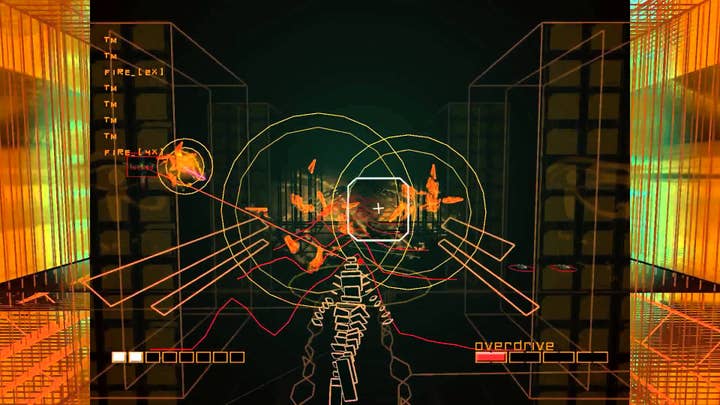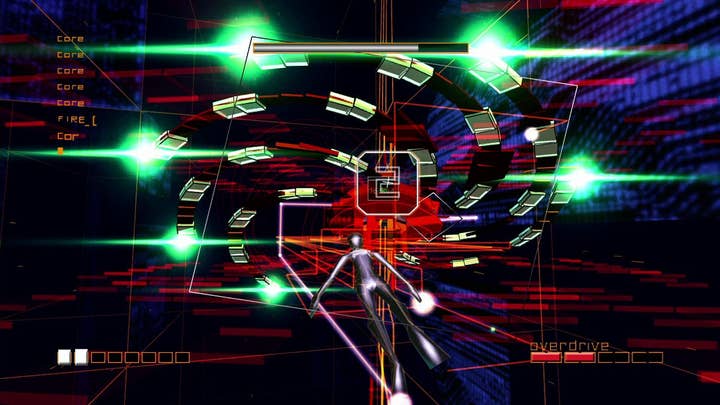Rez and the power of owning your own experience
Why I Love: Friend & Foe's Ivar Dahlberg examines the Tetsuya Mizuguchi classic and how it influences his own very different work
Why I Love is a series of guest editorials on GamesIndustry.biz intended to showcase the ways in which game developers appreciate each other's work. This edition was contributed by Ivar Dahlberg, a developer at Tokyo-based indie Friend & Foe. The studio's latest game is Vane, a game of exploration through an unnerving, minimalistic environment that debuts on the PlayStation 4 today.
Back in 2001 I was taking my first steps towards turning my passion for video games into a profession. Straight out of art school I had enrolled in a brand new education in game development where I would learn 3D modelling and animation, and make games together with other designers and programmers. Through the teachers and students, I had the fortune to be introduced to wide variety of games and genres that I had never seen before.
But nothing left an impression as lasting as when I first played Rez on the Dreamcast. Not only was the game stunningly beautiful and had a soundtrack that I could have listened to for the music alone, it also invited me to create my own experience in a way that no other game had done before.
"The game essentially serves as a mirror for self reflection where the outcome is different depending on what I bring of my own"
It wasn't a dexterity challenge for my fingers, or a test of my intellect where I had to solve puzzles or riddles. Instead I was thrown into a world of sound, music and abstract visuals that spoke straight to my senses. Rez proved to me that games not only could be beautiful, but be a unique artistic expression of their own.
After that first encounter the game stayed at the back of my mind. I wanted to come back for more, but that turned out to be harder than I had thought. When I finally had a console of my own, the game was no longer on sale and finding a second-hand copy was proving to be difficult. Only several years later, when a good friend of mine gave me a copy he found off of eBay, did I get to play it again.
What strikes me when I play Rez is how the game trusts me to be an integral part of its presentation. As I aim and fire, string together combos, or frantically tap the shoot button, the game responds with changes in color and music. And I want it to look good! While essentially a "rail-shooter," it feels less like the aerial combat of Starfox and more like I am moving my cursor across the screen like a paint brush, progressing in the way that best suits my own vision.
In the same way that you don't play a piece of music just to get to the end of it, the ultimate goal of Rez is not to beat the game, but to enjoy it while it lasts. And just like a great song, it's worth coming back to again and again.

The abstract levels and the minimal exposition create a canvas for the player to express themselves on. The narrative arc leaves enough space to let my mind wander, create my own story, and reflect on parallels to real life experiences. By the time I reach the final level, where the evolution of life unfolds in front of me, I'm always surprised by the emotional impact. But the feeling isn't always the same. Sometimes I get a deep feeling of belonging, other times it will make me feel lonely and disconnected. The game essentially serves as a mirror for self reflection where the outcome is different depending on what I bring of my own.
As brilliant as Rez was for its time, it's a true testament to its creative spirit that nearly two decades later it's continued to evolve, from the XBLA HD remaster to the current Rez Infinite with its VR capabilities and new Area X zone. There is even the Synthesia Suit that simulates the game's pulsating beats as vibrations across your body.
In 2016 I was lucky enough to try out this most recent addition at an exhibition atop Mori Tower in Tokyo. At that time, I was halfway through the development of Vane and I started to realise how important this game has been to my own creative goals. Even though, at first glance, there aren't many similarities apart from the faceted visuals, Rez has inspired many of the decisions in the creative process.
The fact that a story can be more than just what happens on screen, and the realization that the player can be a central part of how the game is presented are lessons that I have taken to heart. Even a seemingly linear experience like Rez can deliver something far more engaging and open-ended by allowing the player to bring their own emotions and forge their own narrative. A game is a collaboration between its creators and the player and it's crucial to trust the player to bring out the best of it while also adding a part of their own. In Rez, more than any game I've played, your experience is truly your own.
Developers interested in contributing their own Why I Love column are encouraged to reach out to us at news@gamesindustry.biz.
